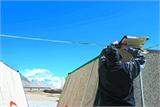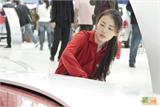Nearly 100 medical support staff from various large hospitals in Beijing have arrived at the earthquake-stricken area.
At 2:44 AM on May 18th, the Sina.com earthquake relief support team arrived at Chengdu Shuangliu Airport. Even before the cabin door opened, we learned from a colleague at the Chengdu Commercial Daily that a 5.9 magnitude aftershock (later confirmed as 6.0 by the Earthquake Network Center) had just occurred in Jiangyou City, and Chengdu had felt the tremor.
Upon hearing this news, the passengers on the plane looked solemn. Among them were nearly a hundred medical personnel dispatched from major hospitals in Beijing to the disaster area. These medical personnel came from various large district hospitals in Beijing, such as Haidian and Chaoyang, mostly consisting of volunteers. Some of them were wearing camouflage uniforms and equipped with amateur outdoor gear. From the checked luggage, it was evident that a large quantity of anti-inflammatory drugs, gloves, masks, and other medical supplies were being urgently transported to the disaster area.
Outside Shuangliu Airport, there were four Sichuan Airlines disaster relief material dedicated freight trucks parked. On the airport expressway leading to the urban area of Chengdu, vehicles carrying supplies could be seen rushing back and forth.
The aftershock in Jiangyou at 1:08 AM was also felt in Chengdu, causing citizens to rush onto the streets, unwilling to stay indoors. Around 3:40 AM when the vehicle reached the urban area of Chengdu, the situation had gradually calmed down, with residents on the streets returning to their homes. Only a few makeshift tents could still be seen scattered on the streets.
It was learned that Chengdu suffered almost no losses in this earthquake disaster, with no buildings collapsing. Roads and public facilities remained intact, and even many brick houses preserved from the 1940s endured the earthquake test.
The order on the streets was good, and convenience stores and restaurants were still operating normally late into the night. Some entertainment venues and internet cafes were brightly lit with many vehicles parked outside. According to the accompanying driver, prices in Chengdu's market have basically remained stable. A few days ago, rumors about water pollution in Chengdu caused a panic buying spree for drinking water among citizens. "In the supermarket, apart from soy sauce, all purchasable liquids were sold out." However, the rumors were quickly dispelled, and normalcy was restored soon after. Currently, tents are relatively scarce commodities, but medicines, food, and other basic consumer goods are adequately supplied without any noticeable price increase.
In the quiet Chengdu night, many private cars were found parked in squares or at intersections, with people lying inside, the sunroofs or windows open, and umbrellas set up on the car roofs due to rain. Many Chengdu residents, unable to obtain tents and fearing the safety of staying indoors, chose to spend the night in their cars.
Upon entering the hotel, while passing through the corridor, I noticed the lighting flickering due to unstable voltage, which lasted about 40 seconds before returning to normal.



